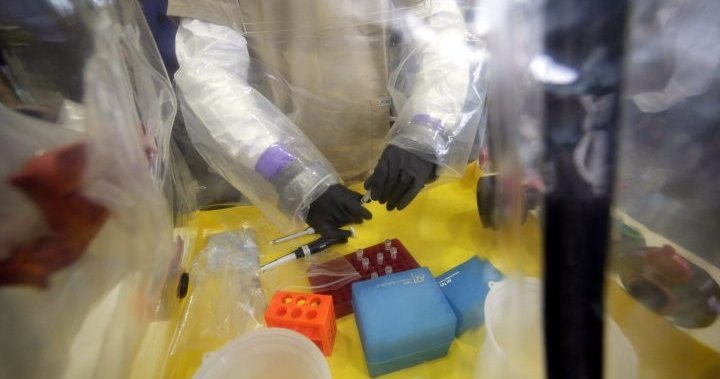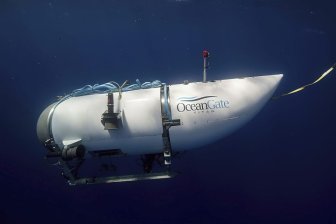While Canada’s intelligence service decided two scientists working at a high-security Winnipeg virology lab in 2019 were a likely threat to national security, their alleged actions do not appear to have been guided by foreign agents.
More than 600 pages of former secret documents, released by the Liberal government Wednesday afternoon, detail the nearly two years of investigation that led the Canadian Security Intelligence Service (CSIS) to recommend that Xiangguo Qiu and her husband, Keding Cheng, lose their security clearances.
Qiu and Cheng, worked at Winnipeg’s National Microbiology Laboratory until July 2019, when they were escorted from the premises over what officials described as possible security breaches. They were fired in January 2021.
Subsequent investigations, including by CSIS and the Public Health Agency of Canada (PHAC), determined that Qiu hid her relationships with Chinese research associations and shipped some materials from the Winnipeg lab without authorization.
While many details of Qiu and Cheng’s case were reported through leaks to media, the case became a lightning rod for scrutiny during the COVID-19 pandemic, and as federal Liberals fought for years to keep the documents secret.
The documents range from mundane email chains to “Canadian Eyes Only” security assessments, largely uncensored and released in a batch by Ottawa on Wednesday.
But they offer a glimpse into the investigations that ultimately led to the two scientists’ dismissal.
“Clandestine” relationships with groups in China
Some of the most revealing information comes from two sets of CSIS interviews with Qiu and Cheng.
Breaking news from Canada and around the world
sent to your email, as it happens.
The first CSIS interviews were conducted in March 2020, prompted by an internal PHAC investigation into whether Qiu improperly sent Canadian intellectual property, specifically, information related to an inhibitor for the Ebola virus. Cheng was also accused of breach of the lab’s policy after students under his supervision allegedly attempted to remove lab property.
Qiu expressed concern over paperwork and bureaucratic delays in collaborating with scientists at other laboratories, and suggested she wasn’t aware or didn’t pay attention to some of the lab’s security policies.
The CSIS assessment concluded that “due to certain features of character – such as her overriding faith in the good intentions of other scientists, and a clear desire to avoid rules or procedures that could slow her down,” that she “does not truly grasp the importance of protecting sensitive information.”
The tone in CSIS’s July 2020 follow-up interview was notably different after the agency uncovered information about Qiu’s extensive ties to Chinese research universities and entities, which CSIS suggested Qiu withheld during their first interview.
Those ties include visiting professors and researchers at the Beijing Institute of Biotechnology, Hebei Medical University, the National Institutes for Food and Drug Control, and the Wuhan Institute of Virology.
The updated CSIS assessment accused Qiu of “clandestine” relationships with entities in China, and a “complete lack of candour” regarding those relationships.
“(The) service now assesses that Ms. Qiu developed deep, collaborative relationships with a variety of People’s Republic of China (PRC) institutions and has intentionally transferred scientific knowledge and materials to China in order to benefit the PRC government, and herself, without regard to the implications to her employer or to Canada’s interests,” the CSIS document concludes.
Was there evidence of direct foreign interference?
While CSIS assessed that Qiu “acted, may act or may be induced to act in a way that constitutes a threat to the security of Canada,” the documents do not suggest that she or Cheng were put up to any of their actions by agents working for China.
“The Service does not have a reason to suggest that Ms. Qiu would willingly cooperate with a foreign power knowing that harm would come to Canada,” the initial CSIS assessment stated, although it added that features of her character might make her susceptible to influence operations.
In Cheng’s case, CSIS narrowed in on his apparent ignorance of his wife’s ties to PRC research institutions and programs.
“Despite being given ample opportunities to provide truthful statements to the interviewers … Mr. Cheng failed to tell the truth in areas where he needed to most,” the document read.
“Mr. Cheng’s responses were simply not credible, which reflects adversely on his personal trustworthiness and therefore his basic reliability, the primary building block of security clearance.”
How did both scientists respond to findings?
Both Qiu and Cheng disputed many of the investigations’ findings, and launched a grievance questioning the fairness of the probe. They also suggested they were treated “differently and more severely” because they were Chinese.
“Being a research scientist that almost pays no attention to politics … It was only during the investigation interview that I started to know some new words for me, like ‘NATO,’ ‘Spy,’ and ‘espionage,’” Qiu wrote to an official in October 2020, adding her expertise would be valuable in the fight against COVID-19.
“Thinking back, what happened in the past were (sic) purely due to the lacking of proper training, the misunderstanding and ignorance of the policies of PHAC that I should have spent more time to learn and ask.”
“Please believe me. I am confident that I can contribute to Canada.”
Less than three months later, both Qiu and Cheng were fired.
— With files from Global’s Sean Boynton and David Baxter.
© 2024 Global News, a division of Corus Entertainment Inc.




